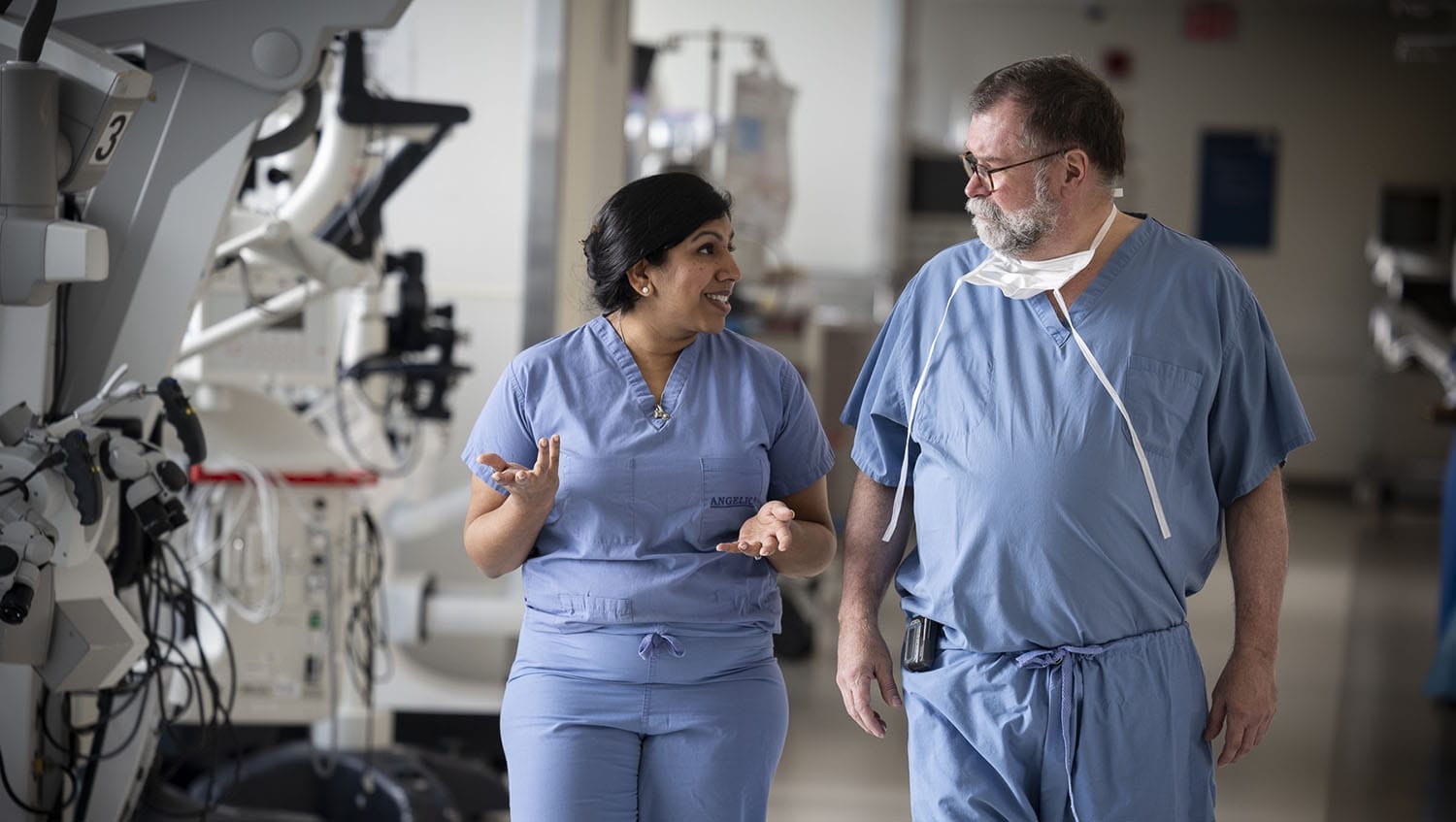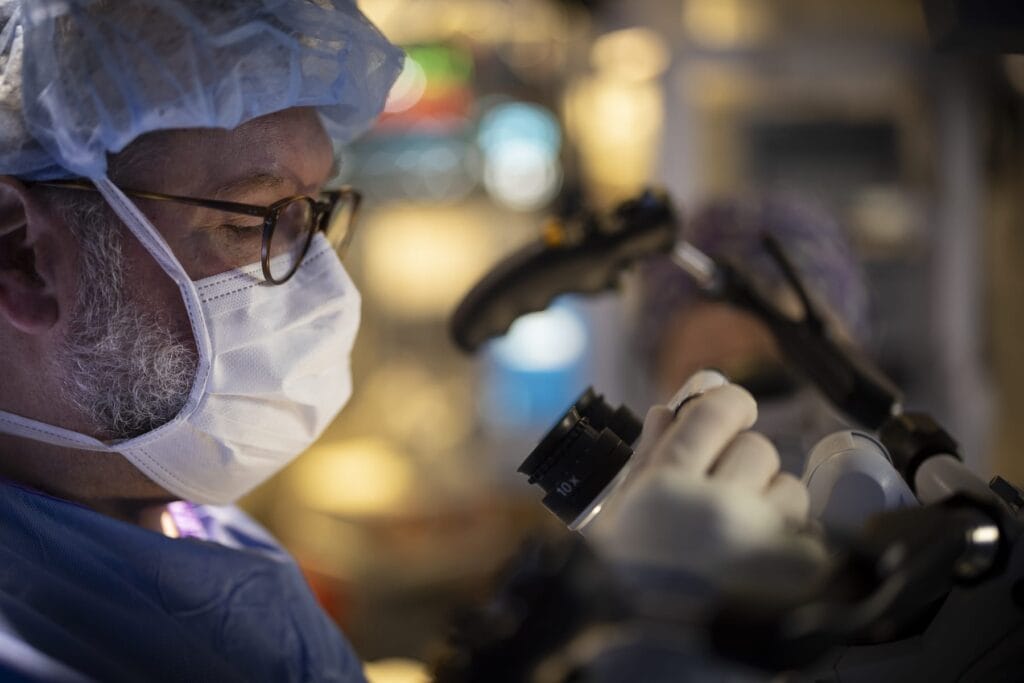Assembling a World-Class Skull Base Surgery Team to Provide Complex Care for All
July 18, 2024
By Sarah Klein

Boston Medical Center
Dr. James Holsapple and Dr. Urvashi Upadhyay of BMC's skull base surgery team in the Neurosurgery Department.
BMC's multidisciplinary, expert team helps patients needing some of the most "complicated procedures done in medicine," says Neurosurgery chief Dr. James Holsapple.
Advancements in endoscopic technology over the past few decades have transformed skull base surgery into a rapidly expanding field, increasingly handled by multidisciplinary, cross-functional teams at large medical institutions.
But even these institutions may only see fewer than 100 cases a year, making a skull base surgery team a luxury not available at most medical centers — and certainly not at most essential hospitals. Boston Medical Center (BMC) is breaking that mold.
“Skull base surgery is extremely resource-intensive, and BMC is making this level of care available to everybody,” says James W. Holsapple, MD, chief of Neurosurgery at BMC. “These surgeries are some of the most expensive and complicated procedures that are done in medicine. That’s just the reality. Many hospitals don’t want to absorb the cost or take on the complexity.”
What is skull base surgery?
The skull base is the floor of the skull — the bottom of the “bowl” that holds the brain, head, and face. It’s a complex zone encompassing parts of the brain, areas of the upper neck outside the skull, and complex areas of the face and head, including the ears, nose, and eyes.
“There are all sorts of structures in that area and all kinds of disease processes that affect it,” says Holsapple. Conditions treated with skull base surgery include vascular issues in the skull, cancers of the sinuses and head and neck, various types of non-cancerous growths and cysts, and tumors on the pituitary gland.
Because of the complexity of the structures within the skull base, patients receive the best care at medical centers with skull base surgery teams that draw from many different specialties and subspecialties. For several years, Holsapple and Gregory A. Grillone, MD, chief of Otolaryngology, have been building out and bolstering the multidisciplinary skull base surgery team at BMC. Today, the team includes ophthalmologists, otolaryngologists, oral surgeons, neurosurgeons, neuroradiologists, neuro-oncologists, radiation oncologists and more.

“Where the multidisciplinary skull base surgery team comes in is operating on tumors that are at the interface of the face, or ear, and the front or side of the brain,” Grillone says. For example, tumors in the back of the nose can occur at the junction of the nose and the brain. Sinus surgeons and neurosurgeons can work together to treat the tumor from both sides, he says.
Uniting as a multidisciplinary team
This work isn’t possible without an understanding of how members of different specialties can best support each other.
“You need to have people who are in these different disciplines who work together as colleagues,” Holsapple says. “But that doesn’t exist everywhere. The center should have specialists of three or four different types, who are familiar with each other, work together, and have trained to do this type of surgery. If you’re missing just one critical player, the whole thing falls apart.”
It took time to bring all of those critical pieces together at BMC.
Today, BMC’s multidisciplinary skull base surgery team is a “world-class assembly,” Grillone says. That’s a testament to the depth and breadth of BMC’s institutional support, explains Holsapple.
“This can only be accomplished in a place that has a certain kind of collection of experts, and that speaks very highly of the institution, that it supports having all these different specialists manage these problems,” he says. “Not all hospitals can do that.”
Mission-driven focus promotes recruitment and retention
BMC’s commitment to providing world-class skull base surgery to all patients, no matter their financial background or insurance coverage, is helping to drive recruitment and retention, according to the team.
“The people that really get our mission, they come to BMC and stay for many years,” Grillone says. “What makes you want to come to work every day is the joy of working and the satisfaction of helping people who might not otherwise have the means to get this care.”
Now, the team is focused on getting the word out around Boston and across the country.
“The clinicians involved in our skull base surgery group are some of the most highly trained experts in their particular specialties,” Grillone says. “But most people are not aware of the program. Very few physicians or their patients know that Boston Medical Center can do this type of surgery, and we’re working to change that. We welcome inquiries from anyone interested in learning more about our program.”
*A version of this story originally ran on Doximity.
To refer a patient or learn more about BMC Neurosurgery, visit Boston Medical Center’s website.


